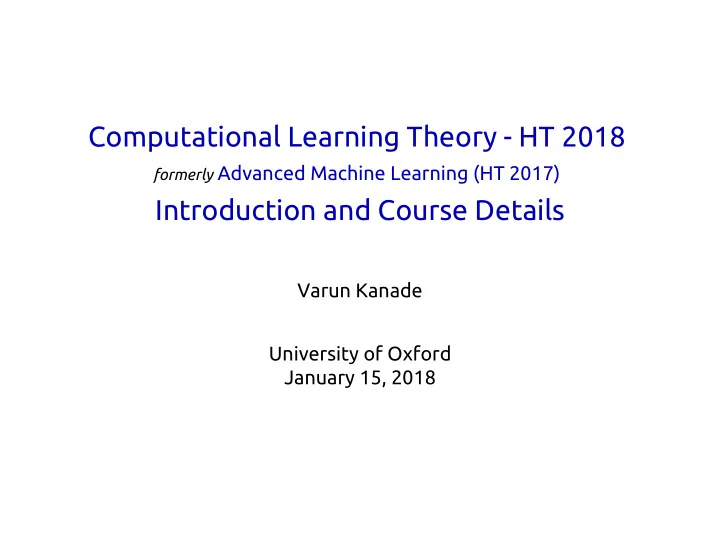

Computational Learning Theory - HT 2018 formerly Advanced Machine Learning (HT 2017) Introduction and Course Details Varun Kanade University of Oxford January 15, 2018
What is Machine Learning? ◮ 200-basic level categories ◮ Here: Six pictures containing airplanes and people ◮ Dataset contains over 400,000 images ◮ Imagenet competition (2010-17) ◮ All recent successes through very deep neural networks! 1
What is Machine Learning? Movie / User Alice Bob Charlie Dean Eve The Shawshank Redemption 7 9 9 5 2 The Godfather 3 ? 10 4 3 The Dark Knight 5 9 ? 6 ? Pulp Fiction ? 5 ? ? 10 Schindler’s List ? 6 ? 9 ? Netflix competition to predict user-ratings (2008-09) Any individual user will not have used most products Most products will have been used by some individual 2
Supervised Learning Training data has inputs x (numerical, categorical) as well as outputs y (target) Regression: When the output is real-valued, e.g., housing price Classification: Output is a category ◮ Binary classification: only two classes e.g., spam ◮ Multi-class classification: several classes e.g., object detection 3
Unsupervised Learning : Group Similar News Articles Group similar articles into categories such as politics, music, sport, etc. In the dataset, there are no labels for the articles 4
Active and Semi-Supervised Learning Active Learning ◮ Initially all data is unlabelled ◮ Learning algorithm can ask a human to label some data Semi-supervised Learning ◮ Limited labelled data, lots of unlabelled data ◮ How to use the two together to improve learning? 5
Outline What is Machine Learning? What is Learning Theory? Course Logistics
What is Learning Theory? The goal of (computational) learning theory is to develop formal models to analyse questions arising in machine learning ◮ How much data do we need to learn? ◮ What amount of computational resources are necessary for learning? ◮ Are there hard learning problems? 6
What is Learning Theory? In this course we’ll cover several models that aim to capture questions that are of interest in modern machine learning ◮ (How) can we learn in the presence of noisy data? ◮ What can we learn when data is obtained in an online manner? ◮ (How) can we do useful machine learning while preserving privacy? ◮ Can we learn when data and computational power is distributed? 7
What is Learning Theory? Towards the end of the course we’ll cover some of the latest topics in the area ◮ Can we develop a theoretical understanding of neural networks? ◮ Connections to information theory, game theory, etc. ◮ Conference on Learning Theory (COLT) 8
Outline What is Machine Learning? What is Learning Theory? Course Logistics
Course Information Website www.cs.ox.ac.uk/people/varun.kanade/teaching/CLT-HT2018/ Lectures Mon, Thu 16h-18h (between 20-24 contact hours) Classes Weeks 3-8 (possibly skip one) Instructors: Francisco Marmolejo, David Martínez, Ninad Rajgopal Office Hours After lectures or by appointment 9
Course Information Textbooks Kearns and Vazirani - An Introduction to Computational Learning Theory Mohri, Rostamizadeh, Talwalkar - Foundations of Machine Learning Shalev-Shwartz and Ben-David - Understanding Machine Learning Papers and (rough) lecture notes will be posted Assessment Take Home Exam Piazza Use for course-related queries Sign-up at piazza.com/ox.ac.uk/other/cltht2018 10
Who should take this course? In this course, we will cover ◮ Mathematical formulations for different learning paradigms ◮ Definitions, theorems, proofs ◮ Design and analysis of learning algorithms ◮ Provable guarantees on run-time and sample complexity 11
Who should take this course? In this course, we will cover ◮ Mathematical formulations for different learning paradigms ◮ Definitions, theorems, proofs ◮ Design and analysis of learning algorithms ◮ Provable guarantees on run-time and sample complexity In this course, we will not cover ◮ Practical applications of learning algorithms - although understanding the theory will likely make you a better practitioner 11
Who should take this course? It is expected that you will be familiar with most of the following ◮ The notion polynomial time, space, etc. ◮ Big O notation ◮ Basic probability theory - expectation, independence, etc. 12
Who should take this course? It is expected that you will be familiar with most of the following ◮ The notion polynomial time, space, etc. ◮ Big O notation ◮ Basic probability theory - expectation, independence, etc. It’d be helpful if (though not necessary that) you’ve seen at least some of the following ◮ Basic complexity theory such as NP-completeness ◮ Applied Machine Learning ◮ Optimisation algorithms - Linear Programming 12
Who should take this course? This is an advanced theoretical course. If you are taking this course, you should ◮ Be keen to understand the theory behind machine learning algorithms ◮ Be able to fill in details of algorithms and proofs omitted in the lectures ◮ Develop an ability to read research papers 13
Recommend
More recommend